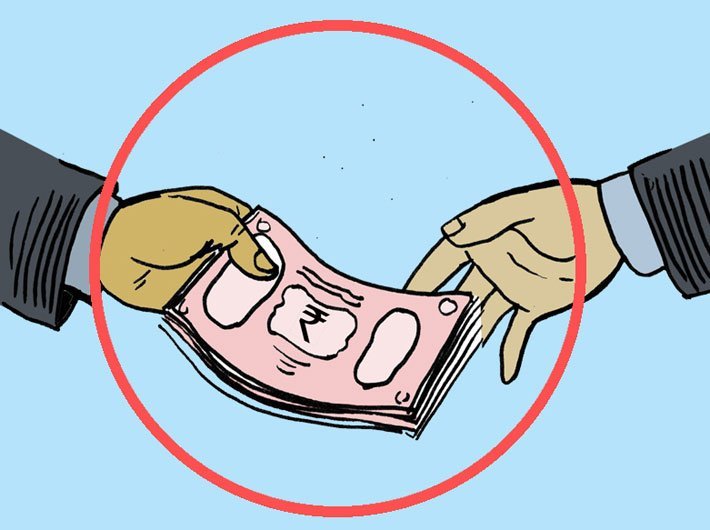Requests for academic study reports are stonewalled: PM's vision of transparency has not penetrated into the bureaucracy
During his reply on the Motion of Thanks to the Address of the President of India, in the Lok Sabha on February 7, prime minister Narendra Modi compared his government's efforts to curb corruption and flush out black money to Swachh Bharat Abhiyan – the nationwide mission launched to clean up cities, towns, villages and roads, build community toilets and end the practice of open defecation. He drew attention once again to his government's emphasis on 'transparency in governance'. Despite the clear signals from the topmost level of the government, key departments and agencies are failing to abide by this important principle.
The ministry of finance and one national public finance institute under its control, have both refused to reveal the research reports on black money in the domestic sector under The Right to Information Act, 2005 (RTI Act). More interestingly, the special investigation team (SIT) on black money has claimed that it does not have a copy of the study reports on the nature and volume of black money in India prepared by at least three academic institutions. The finance ministry and the national institute of public finance and policy (NIPFP) which also responded to the same information request are not on the same page as to why this report cannot be made public. While the ministry is claiming parliamentary privilege [Section 8(1)(c)] over these reports, NIPFP is taking refuse under a confidentiality agreement it signed with the ministry.
Response of the Black Money SIT
In October 2017 around the 12th anniversary of the RTI Act the central information commission (CIC) declared the SIT on Black Money a public authority under the RTI Act in my appeal case. Later in December, upon the prompting of a reader, I submitted another RTI application to the Black Money SIT, seeking the following information:
“Apropos of its decision dated 10/10/2017 in the matter of Venkatesh Nayak vs CPIO, C/o Member Secretary, Special Investigation Team on Black Money (Complaint Case No. CIC/DOREV/C/2016/294561-BJ), wherein the Hon’ble Central Information Commission’s was pleased to record its finding that the Black Money SIT is a “public authority” under the RTI Act, I would like to obtain the following information from your office under the RTI Act:
1) A clear photocopy all study reports prepared by the National Institute of Public Finance and Policy, on the subject of “quantum of black money” and received by your office, till date;
2) A clear photocopy all study reports prepared by the National Council of Applied Economic Research, on the subject of “quantum of black money” and received by your office, till date;
3) A clear photocopy of all study reports prepared by the National Institute of Financial Management, on the subject of “quantum of black money” and received by your office, till date;
4) The total number of reports submitted by the Black Money SIT to the Hon’ble Supreme Court of India, till date, along with the title of each report and the date of such submission;
5) A clear photocopy of all reports referred to at para #4 above along with all Annexures."
Four public authorities related to unearthing black money gave four different replies. The RTI application and the replies received are in the attachment.
Strangely, the foreign tax and tax research-I division of the central board of direct taxes (CBDT) was the first to respond in January 2018 claiming that the information sought did not pertain to their office. The first three queries were transferred to the dept. of economic affairs and the remaining were sent to the investigation division of the dept of revenue. My RTI application was primarily about action taken in India (and not abroad) to inquire or investigate the phenomenon of black money accumulation. It is not clear why the RTI application was transferred to them in the first place.
The Investigation Division-IV of the dept. of revenue replied that they are only concerned with investigation of tax evasion petitions and transferred the RTI application to the Investigation Division-I of the same dept. By this reckoning, perhaps black money has not yet become the subject of any tax evasion petition.
A week later the central public information officer (CPIO-Ad ED) of the Black Money SIT replied that his office did not have any of the study reports on black money prepared by the NIPFP, NCAER and NIFM. So he transferred that portion of the RTI application to these three institutes. As regards queries 4-5 of my RTI application, the CPIO merely replied that five reports on black money had been submitted to the supreme court in an ongoing case. He conveniently did not respond to the request for a copy of these reports. So it was neither rejection of the request nor intention to disclose from the office of the enforcement directorate (ED) which is one of the constituting elements of the Black Money SIT. Incidentally, the ED is an exempt organisation under Section 24 of the RTI Act. However, the exemption does not extend to information pertaining to allegations of corruption or human rights violation.
Two days after the PM compared his government's efforts to flush out black money to Swachh Bharat Abhiyan, in the Lok Sabha, the investigation wing-I of the dept. of revenue claimed that the academic study reports on black money submitted by NIPFP, NCAER and NIFM were covered by parliamentary privilege under Section 8(1)(c) of the RTI Act and hence could not be disclosed.
As regards the Black Money SIT reports submitted to the apex court, the CPIO claimed that his office did not have a copy and transferred that portion of the RTI application back to the CPIO of Black Money SIT.
NIPFP's RTI reply
Meanwhile, the NIPFP replied that their report on "Black Money" is a classified document and confidential under the terms of the agreement with the Dept. of Revenue, Ministry of Finance. So it cannot be disclosed under Section 8(1)(a) of the RTI Act (see page 8 of the attachment). In the matter of Ram Jethmalani & Ors vs Union of India & Ors (popularly known as the black money case) the supreme court had rejected the then UPA government's claim that a confidentiality agreement contained in a double tax avoidance treaty with a foreign country should supersede the citizens' right to know. Public authorities are now citing confidentiality clauses in domestic agreements to reject access to information. There is no such ground under Section 8(1)(a) of the RTI Act either.
So it looks like the PM's vision of transparency has not penetrated deep enough into the bureaucracy which does not have a consensus view on why the study reports on black money cannot be made public. Instead they are making desperate efforts to overstretch the exemption clauses to deny access to information.
Even more strange is the claim of parliamentary privilege to withhold access to the academic study reports. According to the proviso under Section 8(1) of the RTI Act, information that cannot be denied to parliament or a state legislature cannot be denied to a citizen under the RTI Act. It is not clear how parliamentary privilege will be affected by disclosing an academic study report. NCAER and NIFM are yet to send a reply to the RTI application transferred to them.
So while the NDA's election campaign-time talk of depositing Rs 15 lakh of recovered black money in every citizen's bank account is long forgotten, detailed information about the action taken to flush out black money is also not available to citizens. Further, not only is the money black, but information about studies undertaken and action taken is also being black-holed.
Meanwhile, as popular theoretical physicist Stephen Hawking demonstrated that black holes have event horizons and some subatomic particles apparently radiate outwards while others are sucked in to oblivion, one of NIPFP's alleged study reports on black money is accessible on the website of a semi-academic journal. How did it appear there despite the confidentiality agreement is a mystery, perhaps lurking inside another black hole!
Read more such blogs at http://www.humanrightsinitiative.org/blog/

